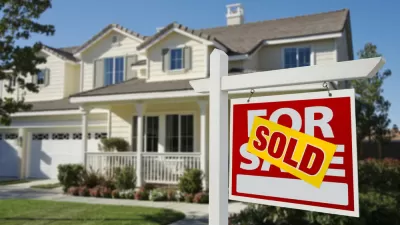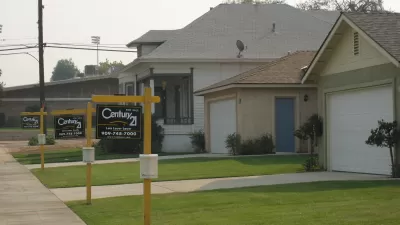A proposed ballot initiative in California would extend the property tax limits offered by Proposition 13 as a lifetime benefit to homeowners over age 55 or severely disabled—even if they move to a new home in another part of the state.

The idea behind a proposed ballot initiative in the state of California would be to provide a property tax incentive to get longtime homeowners to move from their homes. Currently, the property tax cap offers a strong incentive for staying put as the value of homes around California skyrocket.
As reported by Katy Murphy, a ballot initiative circulated for signatures by the California Association of Realtors would "expand Proposition 13, the landmark constitutional amendment passed by voters in 1978 that has kept homeowners’ property taxes artificially low over the years, even as their home values have doubled or even quadrupled. Under the initiative, homeowners who are over 55 or severely disabled would be able to keep those lower tax obligations for life, regardless of how many times they move, as long as they stay in California."
Proposition 13 is already widely blamed for struggles to deliver services at every level of government in the state of California, as well as the state's worsening economic segregation (here's a link to a thorough explanation of Prop 13 and its effects, if you're not already familiar). This statewide ballot initiative is not designed to solve those problems, and more debate will surely follow about whether the initiative will improve or exacerbate those challenges, though a report from the California Legislative Analyst’s Office "estimates the annual losses in tax revenue from giving older owners a break would grow to $1 billion or more for schools and at least $1 billion for cities and counties," reports Murphy. Yes, "that’s even after taking into account the higher taxes paid by those buyers who would presumably purchase some of the new inventory."
This ballot initiative is designed to get older homeowners to decamp from their homes and create more real estate transactions. Alex Creel, a lobbyist for the California Association of Realtors, is quoted directly in the article explaining the state of the market: "A lot of older people — and I’m one of those older people, by the way — are feeling locked into their properties....They’re holding onto their property not because they like their house, but because they like their taxes."
The initiative would need 585,000 voter signatures by late March to place the measure on the November 2018 ballot.
FULL STORY: Giving Grandma a tax break to get more homes on the market: realtors’ Prop. 13 ballot proposal

Maui's Vacation Rental Debate Turns Ugly
Verbal attacks, misinformation campaigns and fistfights plague a high-stakes debate to convert thousands of vacation rentals into long-term housing.

Planetizen Federal Action Tracker
A weekly monitor of how Trump’s orders and actions are impacting planners and planning in America.

In Urban Planning, AI Prompting Could be the New Design Thinking
Creativity has long been key to great urban design. What if we see AI as our new creative partner?

King County Supportive Housing Program Offers Hope for Unhoused Residents
The county is taking a ‘Housing First’ approach that prioritizes getting people into housing, then offering wraparound supportive services.

Researchers Use AI to Get Clearer Picture of US Housing
Analysts are using artificial intelligence to supercharge their research by allowing them to comb through data faster. Though these AI tools can be error prone, they save time and housing researchers are optimistic about the future.

Making Shared Micromobility More Inclusive
Cities and shared mobility system operators can do more to include people with disabilities in planning and operations, per a new report.
Urban Design for Planners 1: Software Tools
This six-course series explores essential urban design concepts using open source software and equips planners with the tools they need to participate fully in the urban design process.
Planning for Universal Design
Learn the tools for implementing Universal Design in planning regulations.
planning NEXT
Appalachian Highlands Housing Partners
Mpact (founded as Rail~Volution)
City of Camden Redevelopment Agency
City of Astoria
City of Portland
City of Laramie





























